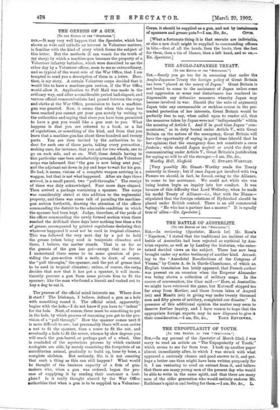THE GENESIS OF A GUN.
[To THE EDITOR OP TEl "SPECTATOR.") Torn,—It may very well happen that the Spectator, which has shown so wide and catholic an interest in Volunteer matters, is familiar with the kind of story which forms the subject of this letter. But the methods (I can vouch for the truth of my story) by which a machine-gun becomes the property of a Volunteer infantry battalion, which were described to me the other day by a Volunteer officer, seem to me so extraordinary, and so typical of the worst side of the War Office, that I am tempted to send you a description of them in a letter. Here, then, is my story. A certain Volunteer corps decided that it would like to have a machine-gun section, if the War Office would allow it. Application to Pall Mall was made in the ordinary way, and after a considerable period bad elapsed, and various official communications had passed between the corps and clerks at the War Office, permission to have a mactine- gun was granted. Now, it seems that when this stage has been reached you cannot get your gun merely by writing to the authorities and saying that since you have been permitted to have a gun you would like a gun sent to you. What happens is that you are referred to a book, or a list of regulations, or something of the kind, and from that you learn that a machine-gun has about three hundred and twenty parts. You are then invited by the authorities to in- dent for each one of those parts, taking every precaution ; making sure, for instance, that you ask for two wheels, one to go on each side, and so on. Well, these details having in this particular case been satisfactorily arranged, the Volunteer corps was informed that " the gun is now being sent you," and the adjutant sat down in joy and hope to wait for his gun. He had, it seems, visions of a complete weapon arriving in a waggon, but that is not what happened. After six days there arrived, in a small parcel, two " pull-throughs." The receipt of these was duly acknowledged. Four more days elapsed. Then arrived a package containing a spanner. The corps was considerably elated at this addition to the regimental property, and there was some talk of parading the machine- gun section forthwith, drawing the attention of the officer commanding the district to the admirable condition in which the spanner had been kept. Judge, therefore, of the pride of the officer commanding the newly formed section when there reached the drill-hall three days later nothing less than a tin of grease, accompanied by printed regulations declaring that whatever happened it must not be used in tropical climates. This was followed the very next day by a pot to hold the grease (when being used in temperate climates) and there, I believe, the matter stands. That is as far as the genesis of the gun has got—except that so far as I understand there seems to be some question of pro- viding the gun-section with a mule, to draw, of course, the " pull throughs," the spanner, and the pot of grease (not to be used in tropical climates); unless, of course, the corps decides that now that it has got a spanner, it will incon- tinently procure a gun from some private firm to fit the spanner; like the man who found a biscuit and rashed out to buy a dog to eat it.
The process of the official mind interests me. Where does it start ? The Irishman, I believe, defined a gun as a hole with something round it. The official mind, apparently, begins with the hole,—I do not know if you have to "indent" for the hole. Next, of course, there must be something to put in the hole, by which process of reasoning you get to the pro- vision of a "pull through." How the spanner comes next it is more difficult to see; but presumably there will soon arrive a nut to fit the spanner, then a screw to fit the nut, and eventually a hole to fit the screw, whence by slow degrees you will reach the gun-barrel, or perhaps part of a wheel. One is reminded of the mysterious process by which eminent zoologists are able, by merely examining the footprints of an antediluvian animal, gradually to build up, bone by bone, a complete skeleton. But seriously, Sir, is it not amazing that such a thing as this can still happen ? What would be thought of the business capacity of a firm of gun- makers who, when a gun was ordered, began the pro- cess of supplying it by sending their customer a heel- plate ? Is it really thought absurd by the War Office authorities that when a gun is to be supplied to a Volunteer
Corps, it should be supplied as a gun, and not by instalments
of spanners and grease-pots P—I am, Sir, &a., orris.
[What a fortunate thing it is that recruits are indivisible, or else a new draft might be supplied to commanding officers in bits,—first of all the heads, then the boots, then the feet for them, then a tin of blanco, then a left hand, and so on.— ED. Spectator.]






































 Previous page
Previous page